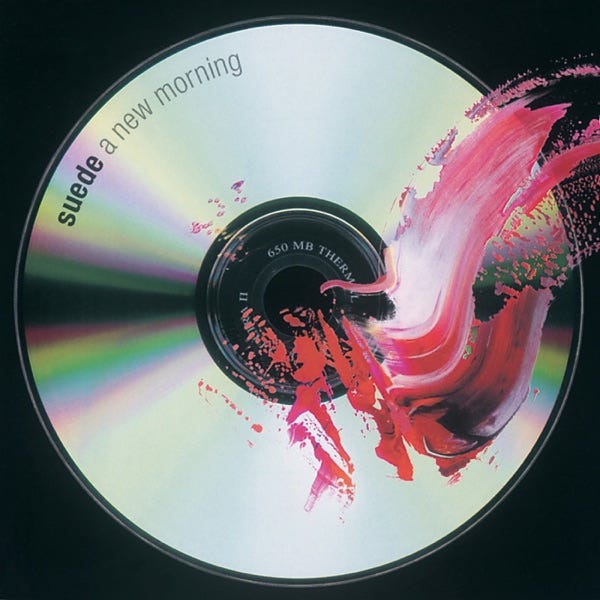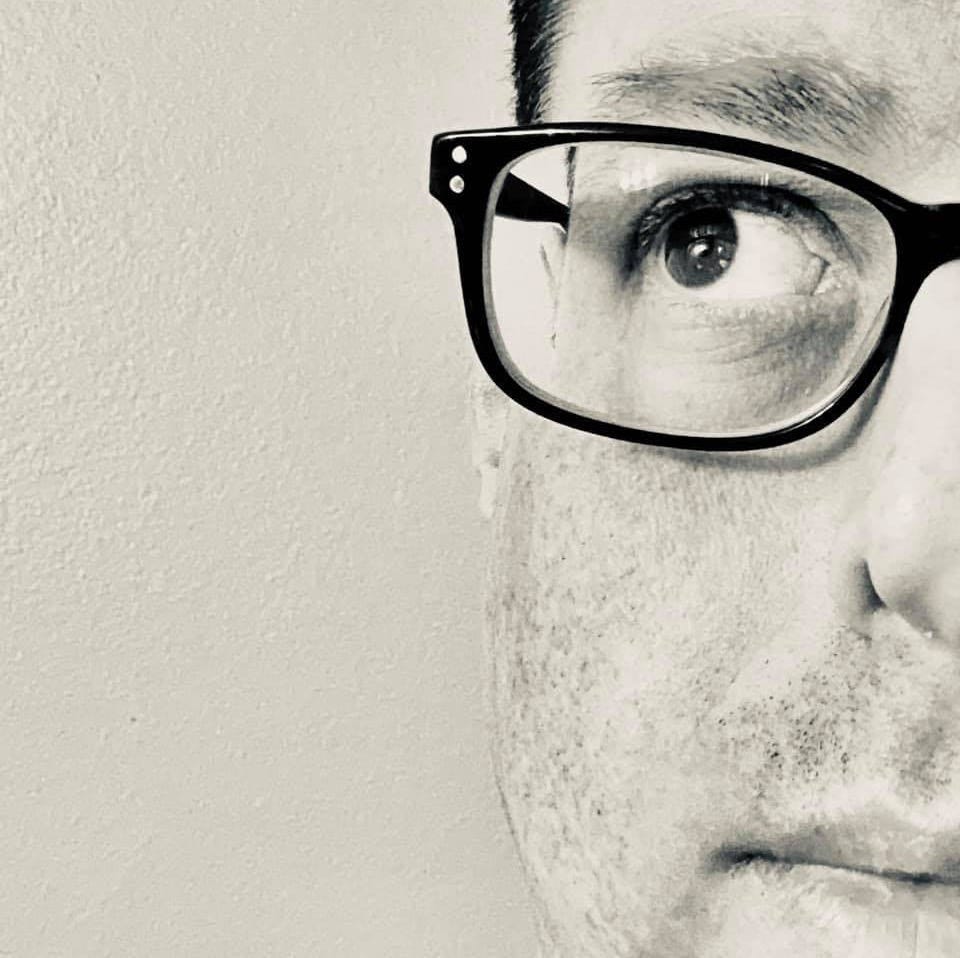A New Morning is the Suede album I forgot existed. That’s not hyperbole. Before starting this retrospective review series, I couldn’t even recall the album title, let alone a single track (except for “Positivity,” which I remembered only because of how negatively I felt about it). At the time of its release in 2002 and in the 23 years since, I had never made it through A New Morning in one sitting. I’ve managed to do it now for the posterity of this review, but I will never do that again. Ever.
In 2002, Suede was a band well past its imperial era. Brett Anderson had recently gotten sober, ending years of drug use that had shaped much of the band’s earlier work, most notably during the making of 1999’s Head Music. While this marked a personal turning point, it also left him creatively adrift. He wrote the lyrics for A New Morning in isolation, drawing on literary influences and nature, but the resulting songs lacked the urgency and spark of Suede’s earlier material. The departure of keyboardist and guitarist Neil Codling in 2001 due to chronic fatigue syndrome further destabilized the group. His replacement, former Strangelove keyboardist Alex Lee, supported the band on tour and officially joined as a member for the recording of A New Morning, but his presence couldn’t restore the band’s chemistry. Guitarist Richard Oakes, bassist Mat Osman, and drummer Simon Gilbert were still on hand, but after the tumultuous years surrounding Head Music, Suede seemed unsure of who they were and what they wanted to be. Not even legendary producers Stephen Street (The Smiths, Morrissey) and John Leckie (The Fall, The Stone Roses, Radiohead) would be able to extract any redeeming qualities from its uninspired songs. Suede was a band running on fumes, and their breakup the following year felt inevitable and—most sadly—an overdue blessing.
I want to be as fair as possible to A New Morning. I listened without bias or prejudice as much as I could, which surprisingly revealed a couple of songs and moments that I think are worthy of a spot in Suede’s canon (albeit nowhere near their top-ranking songs). Still, a look at the top songs Suede played live in 2002 reveals the sorry truth: 7 of the top 10 came from albums other than A New Morning, not exactly a ringing endorsement from a band ostensibly touring in support of their new material. Make of that what you will.
In the 2018 documentary, Suede: The Insatiable Ones, Anderson holds nothing back when discussing the two most contentious albums in their catalogue: “I don’t disown [Head Music] at all, I just regret that it wasn’t seen through with the right kind of conviction… Even though I made [Another New Morning] in a very clean state, there was still a shadow of addiction present… It just didn’t work at all, and I do disown it. Unlike Head Music, I wish we never made it.” As much as I dislike A New Morning, I do not begrudge Suede for making it, but I wholly concur with Anderson; I, too, wish they had never made it.
“Positivity,” a song I lovingly refer to as “Positively Pap,” opens the album with a whimper. Although borne out of a renewed sense of self and purpose coming out of Anderson’s addiction, it’s the kind of song that tries so hard to be uplifting that it ends up sounding hollow and insincere, which was never an adjective that one would associate with Suede. The album’s second single, “Obsessions,” follows and somehow manages to be even worse. I find it vapid, repetitive, and utterly devoid of charm. Its worst offence is how formulaic and self-derivative its lyrics sound, as if Anderson were trying to write another “Trash,” albeit one without any semblance of a hook or chorus. “Lonely Girls” is a soft-focus mess that, for some reason, sounds to me like it could very well have been an outtake from Julio Iglesias’s 1100 Bel Air Place. Like a shirt two sizes too small, it sounds constrictive and an overall poor fit for a band that is best when their music is allowed room to flow and expand.
“Lost in TV” aims to be moody and atmospheric, but ultimately sounds like background music in a dystopian department store. Which is a crying shame, because this Anderson/Osman composition has the potential to be a decent Suede song. “Beautiful Loser” follows, a misfire in every sense. If you’re going to put the word “loser” in a song title, you better make sure the song doesn’t live up to it. This one does. Unfortunately, the downward trend continues. “Streetlife” is dead on arrival, a track that feels like it’s going through the motions without any real conviction. Poor “Astrogirl” is adrift in space with no one to save her (is it too harsh to call it “Astroturf”?)
I don’t fault them for the unoriginal moniker of “Untitled,” given that naming the song after its chorus—“I’m just a stupid guy crushed like a butterfly dead-eyed at the drive by in a car”—would have felt a little too on the nose. “One Hit to the Body” and “When the Rain Falls” are both unremarkable; I didn’t bother to write any notes about them worth repeating.
I did say there are moments on A New Morning that surprised me with just how much I liked them. “...morning” is a song that hints at something better than it ended up being. I don’t mind the mostly acoustic guitar arrangement; in fact, I think it would be a much stronger song if the band had stripped it back to just guitar and voice. I can hear it as a deeply emotional and heartfelt closing track on a different album, one with a better group of songs that had more in common thematically. I was even more impressed with “Oceans,” which features some of the album’s best lyrics, treading familiar ground in the exploration of relationships in ruin with a cinematic eye for scene-setting that is irrepressibly Anderson’s forte. Suede buried the song as a hidden track on the CD, ten minutes after “When the Rain Falls,” but someone had the right mind to let the NME tell everyone about it before the album came out in case listeners abandoned A New Morning (like I did) before making it through to the end. “Oceans” is a quiet, subtle gem of a song that, unlike much of the album, actually sounds like it’s a Suede track.
On a better-produced album with a better class of songs, I could imagine “Oceans,” “…morning,” and even “Lost in TV” serving as anchor tracks on what would be a pretty respectable Suede release steeped in subtle folk flourishes and muted tones. It’s likely what they were aiming for with A New Morning: a stylistic shift away from the industrial harshness of Head Music in the same way each of their albums had been a reaction to the last. But two decent songs and one meh track can’t save a predominantly bland album. Or the band that made it.
A decade after gracing the cover of Melody Maker as “the best new band in Britain,” Suede were sounding like a band that had lost its purpose, and A New Morning suggested that they had nowhere new left to go. When Suede officially announced their split in late 2003, it barely registered as a surprise. What was surprising, though, was how it happened: backstage at The Graham Norton Show, Anderson reportedly leaned over to fellow founding member Osman and whispered, “Let’s not do this anymore,” effectively ending the band with a shrug rather than a bang.
My initial reaction to A New Morning in 2002 wasn’t so much disappointment as indifference. The bloom for me had already started wilting with Head Music; by the time A New Morning came along, my musical tastes were shifting, my personal life evolving. Much had changed within Suede—and within me. I couldn’t imagine ever caring about Suede with the same passion and vigour I once did, but time has a way of reshaping things. Their eventual return, over a decade later, was something I never would have believed possible back then, let alone something I would have been interested in. And yet, here I am, grateful for Suede’s second act. Still, A New Morning remains a challenging listen, but one that I now appreciate as a misstep that plays an essential part in the band’s journey. It’s just one I never care to revisit, but I’m glad I finally did.
![the act of just being [t]here](https://substackcdn.com/image/fetch/$s_!moQy!,w_40,h_40,c_fill,f_auto,q_auto:good,fl_progressive:steep/https%3A%2F%2Fsubstack-post-media.s3.amazonaws.com%2Fpublic%2Fimages%2Fedc03f78-2893-4045-9600-2bacb96b8fa5_1080x1080.png)
![the act of just being [t]here](https://substackcdn.com/image/fetch/$s_!pLeR!,e_trim:10:white/e_trim:10:transparent/h_72,c_limit,f_auto,q_auto:good,fl_progressive:steep/https%3A%2F%2Fsubstack-post-media.s3.amazonaws.com%2Fpublic%2Fimages%2F0d02a71c-d57a-4a4b-b90c-22191b1e1244_2688x512.png)

